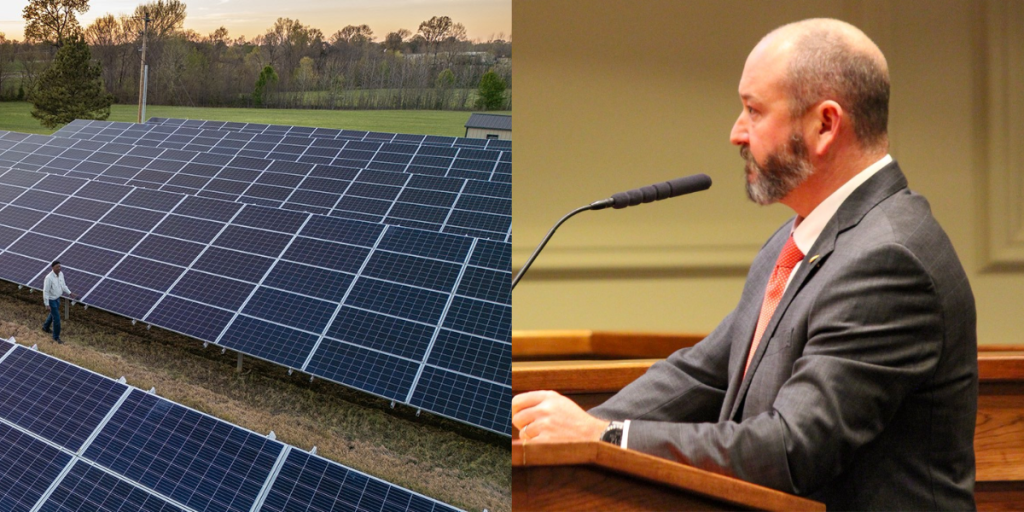Alabama’s desire to stimulate economic growth through innovation, entrepreneurship and technology has a clear roadmap for success thanks to the work of dozens of leaders in Alabama’s public and private sectors.
Those leaders gathered Oct. 14 in Montgomery for the final meeting of the Alabama Innovation Commission (AIC), also known as Innovate Alabama. The commission was created by Gov. Kay Ivey in July 2020 to develop and execute strategies that will drive innovation and entrepreneurship, as well as help attract and retain talent in Alabama.
“We’ve got to be more strategic,” said Bill Poole, Alabama Finance director and chair of the AIC. “The new economy and the future economy is going to surround technology, innovation and research. We’ve got to capitalize on opportunities that are surrounding us.”
Alabama Innovation Commission prepares for future from Alabama NewsCenter on Vimeo.
Poole and state Senate President Pro Tem Greg Reed of Jasper, who serves as AIC vice chair, praised commission members for not only putting together a comprehensive action plan, but for working together to enact key elements of that plan during the past legislative session. The creation of the Alabama Innovation Corporation – a new entity to support statewide entrepreneurship, rural businesses, research and development at existing companies and access to advanced technical skills that will drive a future workforce – is at the top of the achievement list.
“We’ve done great work as the innovation commission – for all the right reasons,” Reed said.
“We have focused Alabama business, the Alabama Legislature, elected officials on this ecosystem idea of entrepreneurship and the focus on high-tech growth, retaining our most talented in Alabama. The fact that we’ve elevated this conversation so much higher than it’s ever been in Alabama is really the biggest accomplishment.”
Reed and Poole said the AIC was a success thanks to the contributions of leaders in both the public and private sectors. Zeke Smith, Alabama Power executive vice president of External Affairs and chair of the AIC Advisory Council, said the work was bolstered through support of Stanford University’s Hoover Institution, a public policy think tank promoting the principles of individual, economic and political freedom. The group, led by Alabama native Dr. Condoleezza Rice, former U.S. secretary of state and AIC Advisory Council member, delivered to the AIC in May a set of growth ideas and policy recommendations.
“That partnership with the Hoover Institution and Stanford University, led by Dr. Rice, and the recommendations through research and data that they are delivering is something we’re very proud of and excited about,” Smith said. “We have now delivered some recommendations that we believe will make a big difference for the state of Alabama in growing this innovative and technology-based ecosystem.”
Among recommendations approved by commission members to be included in the final report:
- Create a retention program targeting talent in science, technology, engineering and math (STEM) fields at Alabama universities and colleges.
- Create an accelerator program that will educate students and faculty about bringing academic research, business ideas and technology from an idea to a licensable product.
- Remove barriers to allow university faculty to become stakeholders in startups.
- Create and/or support programs designed to increase STEM and entrepreneurship offerings in Alabama’s K-12 schools.
- Create an assistance program to fund nonprofits providing upskilling/reskilling programming to adults.
- Market Alabama’s growing innovation ecosystem around the nation.
- Leverage Alabama’s outdoor recreation assets as a tool to attract and retain workforce talent.
- Host a world-class summit for entrepreneurs and investors.
- Develop regionally based mentorship networks for founders and business owners.
- Support efforts to expand high-speed broadband across the state.
- Create regional innovation hubs in Alabama that will fund and incentivize collaboration to build and advance innovation-focused ecosystems.
- Support efforts to create an Open Data Council to make nonsensitive data available to state agencies and members of the public.
- Create an R&D state tax credit for certain targeted, high-growth industries.
- Create an angel investor tax credit that would equal 25% of an equity investment made into a qualifying high-growth business.
- Create two Alabama Innovation Corporation-managed seed capital funds.
- Create a $2 million annual grant program to provide nondilutive-working capital (growth capital) targeted at high-growth companies in need of additional financing.
- The Alabama Innovation Corporation and the state should partner together to apply for and implement the federal State Small Business Credit Initiative.
“Issuing the final report with the recommendations is exciting,” Poole said. “The seeds have already been planted and we’ve already seen those initial sprouts, but can we marshal those assets, form public-private partnerships and implement a plan that leads to success? The state of Alabama has to not only be present in that environment but also competitive in that environment.”
The AIC is scheduled to deliver its final report to Ivey at the end of October. The full report will be posted on the AIC’s website, innovatealabama.org.
(Courtesy of Alabama NewsCenter)













